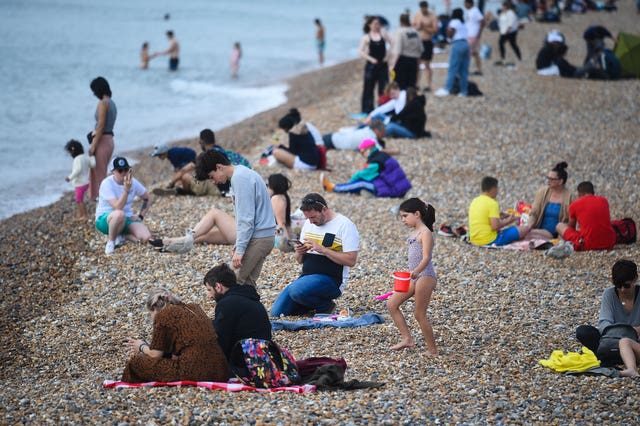
Cyprus said it will open its borders to vaccinated Britons from the beginning of May – although Scottish government restrictions on foreign travel will still be in force, making it illegal to travel.
Nearly a million people in the UK have received two doses of a Covid-19 jab, and the Cypriot government said those who had both jabs could travel without restrictions from May 1.
However, the date Cyprus has set to open its borders to Britons is still more than two weeks before the earliest people in England will be able to leave the country for holidays, while those north of the border are yet to learn a date when travel will be possible.
READ MORE: What you need to know about travel and holidays as lockdown restrictions are eased
It comes as analysis found seaside accommodation prices have risen by an average of 35% this summer compared with last year, owing to a surge in demand for staycations.
The study by consumer group Which? indicated that prices have been hiked in 10 of the UK’s most visited beach destinations, including St Ives, Whitby, Llandudno and Brighton.
Cyprus’s deputy tourism minister Savvas Perdios said the country would allow Britons who had been given vaccines approved by the European Medicines Agency the right to enter without the need for a negative test or to quarantine.
Tourists would be required to have had their second dose at the latest seven days before travel, the minister added.
 Covid-19 vaccine first doses in the UK (PA Graphics)
Covid-19 vaccine first doses in the UK (PA Graphics)
Cyprus has already struck a similar agreement allowing Israeli tourists to enter the country from April 1.
But foreign leisure travel will still be barred for people in England at the beginning of May, with Prime Minister Boris Johnson saying the earliest Britons could jet away is May 17.
This is dependant on various factors related to the coronavirus pandemic, such as vaccine rollouts and the prevalence of Covid-19 variants.
Staycations could begin more than a month earlier, with people in England potentially permitted to stay in self-contained accommodation such as holiday lets from April 12 under Mr Johnson’s road map for easing lockdown restrictions.
This has led to many people opting to plan a holiday at home, resulting in them becoming more expensive.
 A property in Brighton had a large mark-up (Kirsty O’Connor/PA)
A property in Brighton had a large mark-up (Kirsty O’Connor/PA)
Researchers from Which? looked at prices for a total of 15 properties on accommodation booking platforms Airbnb and Vrbo.
The cost of stays in July and August is typically 35% higher now than if the equivalent dates last summer were booked during May and June 2020.
A one-bedroom maisonette in Brighton has the largest mark-up, increasing in price from £53 per night to £127 per night.
READ MORE: Scottish islands podcast launches to keep people connected during travel restrictions
The cost of a one-week stay at a property in Llandudno has risen from £427 to £596, while seven nights in a property in St Ives has gone from £860 to £1,263.
Some price rises were more modest, with a one-bedroom cottage in Scarborough just 7% more expensive this summer.
Airbnb described the analysis as “misleading” and claimed research has shown guests feel the firm is more affordable than other accommodation options.
Vrbo said it “does not set, change or influence the property prices a host chooses”, adding that holidaymakers agree to prices before they book.
Rory Boland, editor of Which? Travel, said: “Many holidaymakers are looking forward to finally going to the seaside this summer, so it’s perhaps not a surprise that high demand has seen prices for some destinations shoot up too.”



Why are you making commenting on The Herald only available to subscribers?
It should have been a safe space for informed debate, somewhere for readers to discuss issues around the biggest stories of the day, but all too often the below the line comments on most websites have become bogged down by off-topic discussions and abuse.
heraldscotland.com is tackling this problem by allowing only subscribers to comment.
We are doing this to improve the experience for our loyal readers and we believe it will reduce the ability of trolls and troublemakers, who occasionally find their way onto our site, to abuse our journalists and readers. We also hope it will help the comments section fulfil its promise as a part of Scotland's conversation with itself.
We are lucky at The Herald. We are read by an informed, educated readership who can add their knowledge and insights to our stories.
That is invaluable.
We are making the subscriber-only change to support our valued readers, who tell us they don't want the site cluttered up with irrelevant comments, untruths and abuse.
In the past, the journalist’s job was to collect and distribute information to the audience. Technology means that readers can shape a discussion. We look forward to hearing from you on heraldscotland.com
Comments & Moderation
Readers’ comments: You are personally liable for the content of any comments you upload to this website, so please act responsibly. We do not pre-moderate or monitor readers’ comments appearing on our websites, but we do post-moderate in response to complaints we receive or otherwise when a potential problem comes to our attention. You can make a complaint by using the ‘report this post’ link . We may then apply our discretion under the user terms to amend or delete comments.
Post moderation is undertaken full-time 9am-6pm on weekdays, and on a part-time basis outwith those hours.
Read the rules here